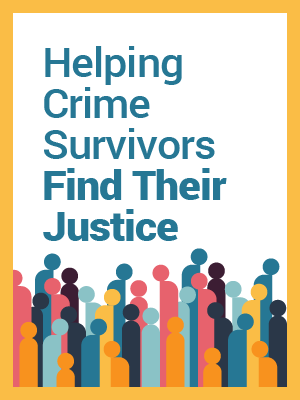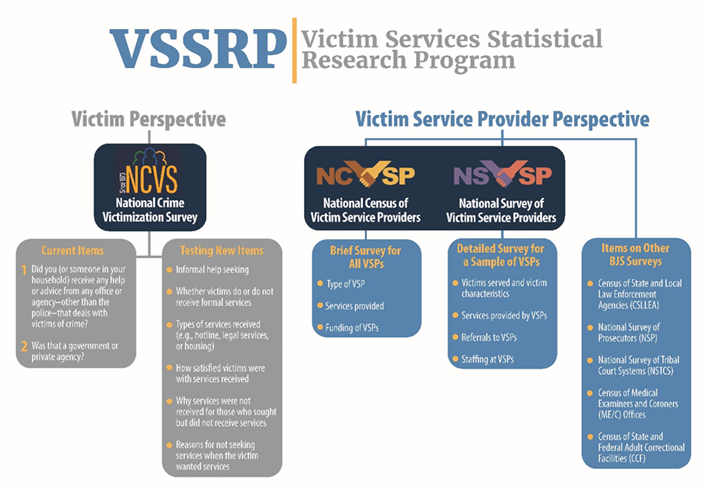Archival Notice
This is an archive page that is no longer being updated. It may contain outdated information and links may no longer function as originally intended.
Research and Evaluation
Measuring the Impact of Victim Services
In FY 2020, RTI International received funding from NIJ, with support from OVC and OVW, to measure the impact of victim services, which resulted in the development of an outcome assessment survey known as the Measures for Providers Responding to Victimization Experiences (iMPRoVE) tool.
The iMPRoVE tool uses best practices in survey research and accounts for the fact that different types of service providers have different intended outcomes for their services. This extensively tested and validated instrument with a user-friendly software platform enables service providers to readily collect and analyze outcome and satisfaction measures. It provides victim service providers with a systematic way of listening to the clients’ voices to ensure their needs are being met to the greatest extent possible and it allows providers to quantify the extent to which their services meaningfully affect victims’ lives.
In FY 2022, OVC awarded nearly $1.5 million to RTI International to implement, manage, and sustain the iMPRoVE project. RTI International is partnering with the Justice Research and Statistics Association (now Justice Information Resource Network) and the Georgia Criminal Justice Coordinating Council Statistical Analysis Center to carry out this effort. Key project activities include developing and implementing—
- an outreach and communication plan to encourage victim service providers to use the iMPRoVE tool.
- a training and technical assistance (TTA) plan that includes online resources, an online helpdesk, group TTA webinars, and peer-to-peer training.
- a data collection and analysis plan, which includes a data dashboard that presents aggregate data collected from the iMPRoVE tool.
- a sustainability plan for the iMPRoVE platform.
RTI International will report on iMPRoVE distribution, its usage and functionality, and the outcomes of victim services.
Data on Crime Victimization
In FYs 2021 and 2022, OVC funded two partner program offices—the National Institute of Justice (NIJ) and the Bureau of Justice Statistics (BJS)—in their endeavors to generate, collect, and analyze quantitative and qualitative data on victimization, victim services, and related topics critical to the field. OVC continued an interagency agreement with NIJ to support research for the field, including efforts to better understand service for victims of crime and research on supporting victims of community violence, the financial costs of crime victimization, and preventing and responding to trafficking in persons in the United States.
In FYs 2021 and 2022, OVC transferred more than $2.7 million to NIJ to assess various projects that support victims of human trafficking:
- In FY 2021, the Board of Regents of the University of Nebraska received funding to (1) identify the ways in which Native Americans are recruited, groomed, and coerced into situations of sex trafficking; (2) elucidate the ways in which Native American survivors of sex trafficking are identified by professionals, and (3) document the role that community members (i.e., bystanders) play in preventing and responding to sex trafficking among Native Americans.
- In FY 2021, the Urban Institute received funding for a study on the process and outcome evaluation of three human trafficking (sex and labor trafficking) victim service providers using the Outcomes for Human Trafficking Survivors (OHTS) Instrument and to conduct a reliability assessment and validity test of the OHTS. It will produce information on the barriers, challenges, best practices, and recommendations for implementing the OHTS, including service provider and survivor perspectives, and produce information on whether services provided by human trafficking service organizations impact survivor outcomes.
- Also in FY 2021, RTI International received funding to perform a focused examination of labor trafficking among construction and hospitality workers, which will include the lived experiences of workers, regardless of whether their exploitation and victimization have been formally identified.
- In FY 2022, the National Opinion Research Center received funding to conduct a 48-month process and outcome evaluation of the OVC Enhanced Collaborative Model (ECM) task forces to build understanding of the how the task forces are impacting the investigation and prosecution of sex and labor trafficking cases, the services provided to survivors, and outcomes for survivors of human trafficking.
During the reporting period, OVC transferred nearly $6 million to NIJ to support evaluation of service programs for crime victims.
In FY 2021—
- the Board of Regents of the University of Nebraska received funding to examine the feasibility, acceptability, and safety of conducting rigorous outcome evaluations with survivors of sex trafficking, document factors associated with sex trafficking survivors, and identify the ways in which engagement with various services relates to the recovery outcomes of sex trafficking survivors. Data will be collected from clients at Call to Freedom (CTF), a nonprofit organization in Sioux Falls, South Dakota, that provides comprehensive, ongoing, and coordinated trauma-informed services to trafficking survivors.
- the National Opinion Research Center received funding to examine the effectiveness, utilization, and comprehensiveness of state crime victim compensation programs in meeting victims’ needs, including best practices for the field and the strengths, barriers, and challenges of policies and funding models.
- the Council of State Governments received funding to examine how national, state, and local contexts influence the distribution of state victim compensation funds, measure their fidelity, and determine the extent to which equity is achieved for victims across multiple dimensions, including race, gender, geographic location, and type of crime.
- the University of Texas Medical Branch at Galveston received funding to conduct a rigorous process and outcome evaluation of chat/text-based services for victims of domestic violence, sexual assault, and human trafficking at a chat/text hotline in Austin, Texas (SAFEline), and additionally, at the Houston Area Women's Center chat/text line.
- RTI International received funding to explore how COVID-19 affected the demand for victim service provision, the impact of local culture and mandates on victim service provision, and the short-term and sustained changes to service models based on innovation or modernization that occurred during the pandemic.
In FY 2022—
- the University System of New Hampshire received funding to evaluate whether the Love146 LTS program can improve the health, safety, and emotional well-being of youth trafficking victims.
- the Urban Institute received funding to examine whether VictimConnect (1) increases access to victim services; (2) improves delivery of those services; (3) protects victims’ rights and confidentiality; and (4) strengthens the efficiency of victim services. The results will contribute to knowledge regarding the use and effectiveness of technology-based victim services.
- the Development Services Group received funding for an evaluation and evaluability assessment of the Montgomery County Family Justice Center (MCFJC), which is a public-private partnership, operated through the Montgomery County Sheriff’s Office. It offers all intimate partner violence survivors who live or work in the county free, coordinated services from a multidisciplinary team of professionals. The project will explore MCFJC operations; examine survivors service experiences and potential outcomes; and identify the challenges and solutions associated with designing a rigorous evaluation of MCFJC that examines outcomes, processes, and cost.
Victim Services Statistical Research Program
OVC continued its support and partnership in advancing BJS’s Victim Services Statistical Research Program (VSSRP), which is building a critical body of knowledge for the field by collecting and analyzing data from victims and the diverse entities that serve them nationwide.
In addition to enhancing information collected from existing sources of BJS data, the VSSRP includes a number of groundbreaking initiatives to facilitate collecting information from victim service providers throughout the United States. This includes the first-ever National Census of Victim Service Providers (NCVSP) and the National Survey of Victim Service Providers (NSVSP)—both designed to help define and enhance understanding of all types of providers that play a key role in the response to crime victims, including those that are community and justice system based, as well as campuses, hospitals, corrections facilities, legal services, and more. The census data provide quantitative information about how many providers exist, their organizational structures, the types of services they offer, the crime types served, and staffing considerations.
After the NSVSP was administered in 2019, BJS published Services for Crime Victims, 2019 in October 2021 showcasing results from the survey. The report featured tables and figures focusing on the average number of different services provided by victim service providers, the most common services provided, and gaps in services. Information is also available by the type of victim service provider. A clean data file with responses to the survey was also published on the National Archive of Criminal Justice Data for public use.
In March 2022, BJS—in collaboration with the Justice Research and Statistics Association (now Justice Information Resource Network), Westat, and the National Organization for Victim Assistance—began research and planning for the 2023 National Census of Victim Service Providers. Initial steps include reassessing the scope of providers covered, engaging with subject matter experts, and identifying possible changes to the existing instrument.
National Crime Victimization Survey
In FYs 2021 and 2022, OVC continued to provide funding to support the strengthening of victimization data through the redesign and modernization of the National Crime Victimization Survey (NCVS). This multi-year initiative to fill long-standing gaps in information includes efforts to—
- provide subnational estimates. While the original purpose of the NCVS was to provide estimates of victimization at the national level, its subnational program will generate victimization estimates at the state and local levels for the 22 largest states.
- modernize the survey instrument design and methodology.
- generate better and more comprehensive measures of crime.
- expand the information collected regarding formal and informal help-seeking behaviors, victim services, issues related to fear of crime, perceptions of neighborhood disorder and satisfaction with police, and the consequences of victimization.
In March 2022, BJS released an update on the instrument redesign. The new NCVS core instrument—
- maintains a two-stage measurement approach in screening and classifying criminal victimization.
- features updated crime screening questions that improve the quality of information collected and allow for more efficient flow through the crime incident report.
- collects expanded information on victimization incidents and victim help-seeking.
- introduces noncrime questions on police performance and community safety.





